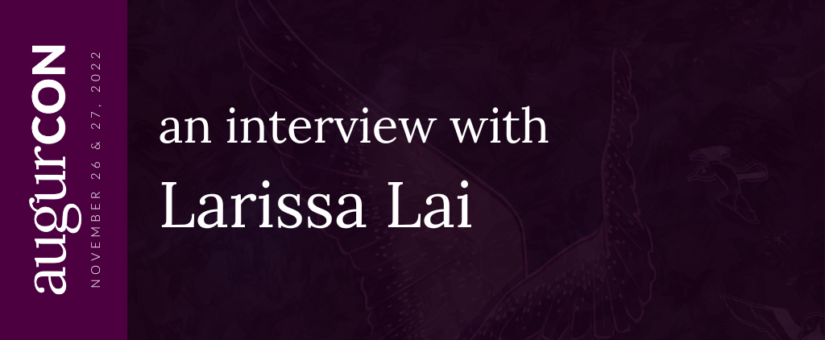
An interview with Larissa Lai #AugurCon2022
- Posted by Augur Blog
- On November 24, 2022
- 0 Comments
- author interview
On November 26 & 27 we’re hosting our second-ever AugurCon, our virtual celebration of speculative literatures! We’re joined by over 45 amazing guests, including authors, poets, editors, and publishing professionals, to explore the intersections of the world we know—and the ones we dare to imagine.
We connected with Larissa Lai, author of The Lost Century, The Tiger Flu, Salt Fish Girl, Iron Goddess of Mercy (and five other books!), who is a panelist at this year’s AugurCon.
Get your ticket to attend her panel:
Canspec: Creating Communities of Care
Saturday, November 26 at 11 AM–12 PM EST / 8–9 AM PST
To see the full weekend program schedule, visit our website.
You’re on our panel about creating publishing communities of care. What does this mean to you? And in your experience, what does a compassionate, caring publishing space feel like and do? Is there a moment in your career you can highlight where you especially felt that care?
For me “care” is a fraught term—it’s something that feminized people are often asked to do at their own expense, that somehow, especially in roles than tend to be feminized– mother, nurse, teacher, organizer etc.—we must give without a thought for ourselves, and that the harder we can work and the more self-effacing we can be, the more noble we are perceived to be. It’s not very healthy.
For me, it’s better for us to think about our own well-being as something that matters in a community of care, but also that others around us be well and cared for as a matter of our own well-being. So when we make a that statement that you often hear these days, usually from someone attending to history and trying to do the right thing: “I have benefited from someone else’s suffering,” it’s a self-effacement that I’m not sure is helpful.
We say such things in attempt to atone for violence we’ve committed or violence enacted in our names, but this kind of atonement, to me, is often transactional and unproductive (though it can simultaneously be well intentioned). While it’s true that we might benefit from someone else’s suffering—financially or otherwise—this is not real benefit. If your the brother, sister or sibling beside you is suffering, IMHO, you can’t possibly be truly well.
This doesn’t necessarily make the work of care any easier—the agency, energy and resources any one person carries are still limited. For readers or listeners who are interested, I’m working on a series of essays now to think these things through further. I can’t offer a blueprint for how to get there– I don’t really believe in blueprints anyway. What my thoughts might do is help shift the way readers think and feel about things, which might, in turn, shift how they act in any particular instance.
The question you ask about caring publishing spaces is a really important and difficult one because publishing is a key site where ideals bump up against “real world” economics. A 100% caring publishing space would publish and uphold the work of everyone who wants to publish. But of course, such a thing is impossible. How could the publisher possibly do all the work? Who would read all of it? And what sense could we make of it even if we could read it all? Everyone involved would die of overwhelm if not old age before all the work was done.
If 100% care is impossible, then the publisher has to make some choices, these days, choices to do with what topics matter in the present moment; who is writing in thoughtful, interesting or timely ways; what histories the writer comes out of; and what the publisher thinks readers might be interested in.
Once the writer is signed, a good publisher provides intelligent informed editorial support, sufficient lead time to do the work, good jacket design, well-thought-out and well-placed publicity. They help the writer write the best book possible, and they keep an eye out for pitfalls, whether those are factual errors or missteps in judgement. They help the writer see the possibilities and dangers of their work.
I feel well cared for at Arsenal Pulp these days. One of the things I really appreciate about Brian Lam is that he trusts me to do what I need to do, and supports me in it, no matter how wildly imaginative or experimental. (A lot of mainstream presses don’t like to take those kinds of risks. They want more certainty that the thing will sell. But IMHO, you only get something new and meaningful if you take risks.)
Without that particular form of care, I don’t think I’d have been able to develop the kinds of voices and storytelling modes I’ve developed. Brian, and the editors he hires, currently the intrepid Catherine Chen, have also been really good with giving me extra writing time when I need it. I know it’s hard for them when writers request extra time—they have production schedules that go much better if the writer meets the expected deadlines. Though I think they also build contingency time into their production schedules, knowing that the writing process itself is an unpredictable and capricious beast, difficult even for the best of writers to control.
Arsenal is good at recognizing that the writing has an agency of its own, an agency that exists beyond the powers of the writer. For me this constitutes deep care. They are also great at covers. This matters because the cover is the first thing that readers encounter. Arsenal knows that I like to be consulted about the cover, and they always do so. The current designer there, Jazmin Welch, has been super collaborative with me, which I appreciate a ton.
Care also means good publicity—placing the work and the events surrounding it in the best possible venues in order to have the best possible conversations about the work. This is hard in a world where Amazon has so much power and the publishing companies are becoming bigger and more concentrated. I think this is the root problem for many of the current troubles in contemporary publishing. Cynara Geissler and her proteges—until recently Jaiden Dembo, now Erin Chan—really work hard to do the work in a good way.
Your works blend objective and magical realities, connects to community and the past, and imagines possible futures. At Augur, we talk a lot about “stories for the futures we need.” We know what it means to us—but what does that mean to you? How do the themes of your works empower you in this envisioning?
I have been working on a series of essays on this issue. For me there are certain movements that are important: GBLTQ2SA+, Indigenous sovereignty, Black Lives Matter, disability, anti-racist, feminist, Asian Canadian, Asian American, environmental, democracy, and their intersections. My commitments aren’t limited to these but they are the ones in the forefront of my heartmind at present.
There are values too that I embrace, of community, generosity, kindness, justice and “po/ethics”. Much of my SF work has gone towards imagining the kinds of worlds that can emerge from these commitments. In essence, I think that what we need are as many thoughtful imaginings of the future as we can come up with stemming from these commitments and values, though depending on who we are, we’ll each do it differently. We need them all.
We need to put the best ones into action, and we need to attend to what rises from the interactions of what each of us brings to the table. I’m very much against having an agreed-upon map. I’m very much in favour of writing as a mode of attention that can show us when the concatenation of our actions offers us something worth remarking upon and holding up. For me, the future is a gamble—not a total free-for-all—intention and action play a huge part, but I wouldn’t be so arrogant as to suggest I—or any one individual—knows for sure what it should be. And I certainly don’t think we should use any means necessary to get wherever it is we think we’re going. Rather, it’s the journey that matters.
Speculation is important and necessary, but the future is not more important than the present or the past, if only because it never comes. It is always a place that is undecided and incomplete. We always live in the present. In fact, to divide time in terms of past-present-future is a very Western, progressivist way of thinking about time. Not all cultures do it, and even in Western culture, it is not the only way. To think about time as “time immemorial” as some Indigenous thinkers do, or as circular and recurring as some Taoists do, might offer us productive ways to speculate.
For these reasons, I’m not committed to linear narrative as we’re conventionally taught to write it. The earlier novels—When Fox Is a Thousand and Salt Fish Girl—really got into the fragmented, nonlinear narrative. The Tiger Flu and The Lost Century are more linear (linear tends to be more legible for a so-called general audience). But my recent poetry book Iron Goddess of Mercy is fully open to time as circular, or as permeating.
I’m empowered by my speculative practices in the sense that they thematize those questions about time. There is also a long history in speculative fiction of investigating social questions beside technological and fantastic ones. The way I do it gives me the latitude to address these questions in terms of both structure and content.
Let’s say you’re talking to a writer who’s just starting out, just penned their first short story or poem. What’s one thing you would tell them that you wish someone had told you—the good, the ugly, the hopeful?
The advice is easy to give but hard to put into action: Give no power to bullies. I’ll also offer a follow-up observation which is this: They can appear anywhere on the political spectrum, in any walk of life. The closer they are to you, the harder they are to fight or escape.
And if there’s a second piece of advice it is: Focus your love and attention on your own communities. The oppressors don’t need half the attention we give them. If we take it away, they will atrophy.
And the third: What people say is important, but it’s what they do that really matters.
What are your favourite spec fic genres to read? To play in as a writer? If the genres are different, do they interact? If so, how?
I love the feminist speculative fiction of the 1970s, even though in the present some of it would register as quite fraught. I like to play there too, to see what the possibilities are for updating their thinking, especially on human reproduction. I don’t leave the fraughtness to lie—I critique it. Sometimes the critique can open the possibility for new narratives that ask the same questions but answer them differently.
My work has elements of utopian fiction, dystopian fiction, so-called magical realism (though I really dislike that term), and historical fantasy. I’d like to write an alternate history some time. I’ve coined a generic term for what I think I’m doing: insurgent utopia. Insurgent utopia is in essence utopian writing that self-revises in relation to the work and thoughts of others, and that attends to unexpected surprises.
I’d be happy to talk about this more at AugurCon, and will be addressing it directly next week through the seminar series I’m doing online for the Maria Zambrano Fellowship at the University of Huelva in Spain. Interested AugurCon participants are more than welcome to join any of the Zambrano seminars. I’m looking forward to seeing everyone at AugurCon later this month!
Hear more from Larissa: Get your ticket to AugurCon 2022
Larissa Lai is the author of The Lost Century, The Tiger Flu, Salt Fish Girl, Iron Goddess of Mercy, and five other books, and is the recipient of the the Lambda Literary Award, the Astraea Award and other prizes. Involved in cultural organizing, experimental poetry and speculative fiction communities since the late 1980s, Larissa received the Jim Duggins Novelist’s Prize in 2020. She holds a Canada Research Chair at the University of Calgary, on Treaty 7 Territory, where she directs The Insurgent Architects’ House for Creative Writing.
Join Larissa at AugurCon! Our panel on Canspec: Creating Communities of Care takes place on Saturday, November 26. Get your ticket to AugurCon 2022 now!




0 Comments